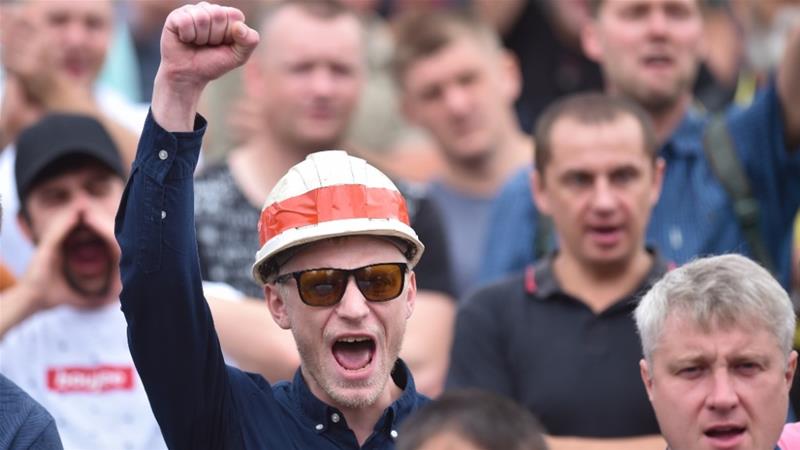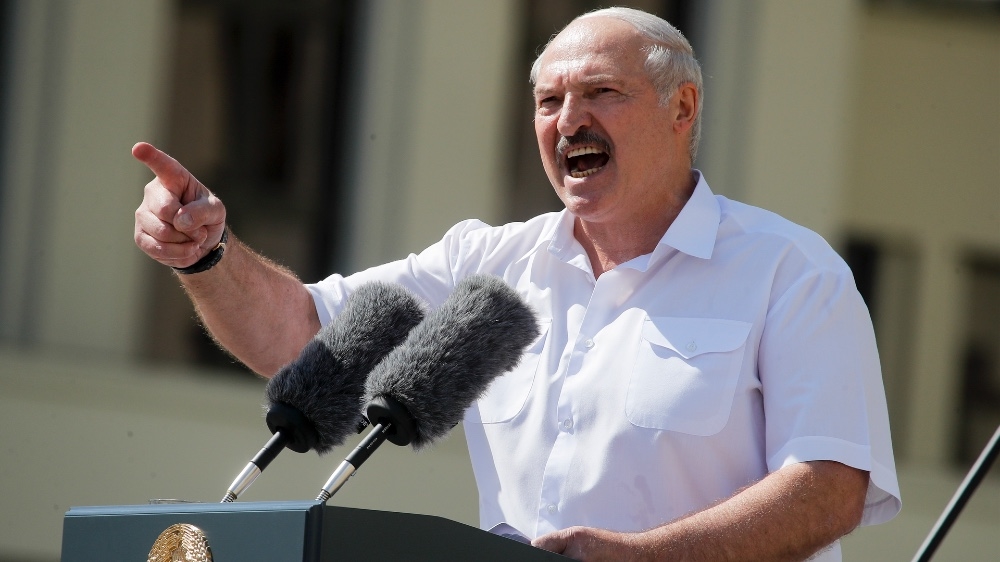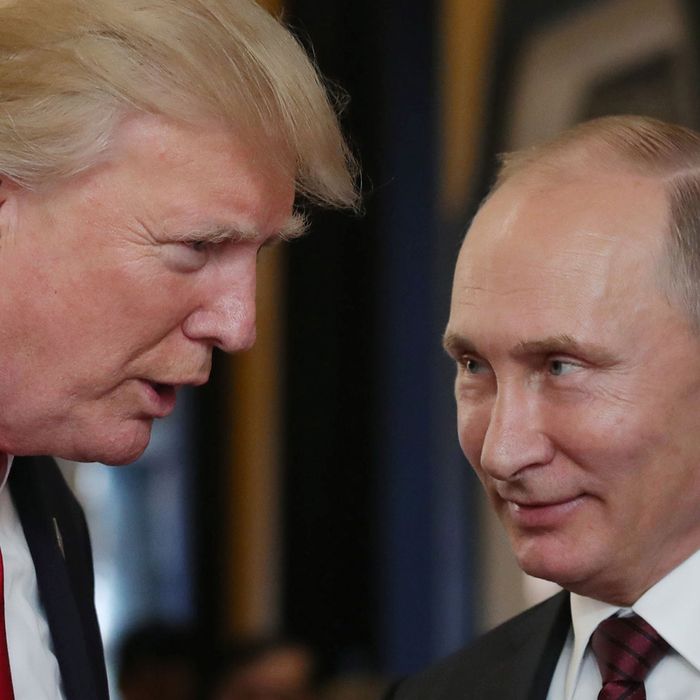German chancellor calls for 'national dialogue' as Belarusians turn up pressure on President Alexander Lukashenko.
AL JAZZERA 8/18/2020

People support striking workers of Atlant household appliances maker [Sergei Gapon/AFP]
More state-controlled companies and factories have joined the strike in Belarus, turning up the pressure on President Alexander Lukashenko to step down after winning an election they say was rigged.
Tuesday's walkouts strengthened the strike that began on Monday, encompassing several large tractor factories in Minsk, a huge potash factory in Soligorsk that accounts for one-fifth of the world's potash fertiliser output and is the nation's top cash earner, state television and the country's most prominent theatre.
The development marked the 10th day of unprecedented mass protests against election results that handed Lukashenko his sixth term with 80 percent of the votes, while his top challenger Svetlana Tikhanovskaya apparently received only 10 percent.
"The authorities should understand that they are losing control. Only Lukashenko's resignation and punishment of those in charge of rigging and beatings [of protesters] can calm us down," head of an independent miners' union Yuri Zakharov told The Associated Press news agency on Tuesday.
"The people said their 'no' to Lukashenko, and we will not back down. The strike will continue and grow until he steps down."
Lukashenko on Monday dismissed the strikes as insignificant and said he would not cave in to pressure, but appeared nervous as dissent grew.
An envoy resigns
Also on Tuesday, the Belarusian ambassador to Slovakia, Igor Leshchenya, said he had handed in his resignation after coming out with a statement in support of the protests.
In a video released on Saturday, Leshchenya expressed "solidarity with those who came out on the streets of Belarusian cities with peaceful marches so that their voice could be heard".
He said he had been shocked by the reports of mass beatings and torture of protesters and accused Belarusian law enforcement of restoring the traditions of the Soviet secret police.
Leshchenya, the first top government official to support the protests against Lukashenko, said in an interview on Tuesday that resigning after that was "a logical move".
The mass protests, which drew hundreds of thousands of people, have continued despite a brutal response from the police, who in the first four days of demonstrations arrested almost 7,000 people and injured hundreds with rubber bullets, stun grenades and clubs. At least two protesters died.
On Tuesday, nearly 1,000 people gathered in front of a theatre to support its troupe who gave notice en masse after the director, Pavel Latushko, was fired for siding with the protesters.
A 'coordination council' forms
Tikhanovskaya left the country for Lithuania in a move her campaign said was made under duress.
On Monday, she announced she was ready to act as a national leader to facilitate a new election.
Her top ally, Maria Kolesnikova, said on Tuesday that a "coordination council" is being formed to represent the people and negotiate the transition of power.
The council will figure out the best way for the transition of power, "be it new elections or some other option", she said.
Lukashenko, who has run the ex-Soviet nation of 9.5 million with an iron fist since 1994, called the launch of the council an attempt to seize power.
"We see it unequivocally: it is an attempt to seize power," he said, adding that he would take measures against those who join the council. "We have enough of these measures to cool down some hotheads."

Lukashenko has run the ex-Soviet nation of 9.5 million with an iron fist since 1994 [Tatyana Zenkovich/EPA]
Western officials refused to recognise the Belarusian election as free or fair and criticised the country's authorities for their violent crackdown on protesters.
In Brussels, European Council President Charles Michel said an emergency summit of European Union leaders would convene on Wednesday to discuss the election and crackdown.
Last week, the 27 EU foreign ministers decided to start drawing up a list of people who could face sanctions resulting from their involvement in the violence.
Merkel, Putin talk
German Chancellor Angela Merkel spoke with Russian President Vladimir Putin on Tuesday, according to her spokesman Steffen Seibert.
"[Merkel] underlined that the Belarusian government must refrain from violence against peaceful protesters, immediately release political prisoners and enter into a national dialogue with the opposition and [civil] society to overcome the crisis," Seibert said.
In its statement, the Kremlin said Putin warned Merkel against foreign interference in Belarus.
Moscow also said it expected the tense situation in its neighbour and ally to soon calm down.
'No more fear!': Belarus president heckled by striking workers (2:32)
More state-controlled companies and factories have joined the strike in Belarus, turning up the pressure on President Alexander Lukashenko to step down after winning an election they say was rigged.
Tuesday's walkouts strengthened the strike that began on Monday, encompassing several large tractor factories in Minsk, a huge potash factory in Soligorsk that accounts for one-fifth of the world's potash fertiliser output and is the nation's top cash earner, state television and the country's most prominent theatre.
The development marked the 10th day of unprecedented mass protests against election results that handed Lukashenko his sixth term with 80 percent of the votes, while his top challenger Svetlana Tikhanovskaya apparently received only 10 percent.
"The authorities should understand that they are losing control. Only Lukashenko's resignation and punishment of those in charge of rigging and beatings [of protesters] can calm us down," head of an independent miners' union Yuri Zakharov told The Associated Press news agency on Tuesday.
"The people said their 'no' to Lukashenko, and we will not back down. The strike will continue and grow until he steps down."
Lukashenko on Monday dismissed the strikes as insignificant and said he would not cave in to pressure, but appeared nervous as dissent grew.
An envoy resigns
Also on Tuesday, the Belarusian ambassador to Slovakia, Igor Leshchenya, said he had handed in his resignation after coming out with a statement in support of the protests.
In a video released on Saturday, Leshchenya expressed "solidarity with those who came out on the streets of Belarusian cities with peaceful marches so that their voice could be heard".
He said he had been shocked by the reports of mass beatings and torture of protesters and accused Belarusian law enforcement of restoring the traditions of the Soviet secret police.
Leshchenya, the first top government official to support the protests against Lukashenko, said in an interview on Tuesday that resigning after that was "a logical move".
The mass protests, which drew hundreds of thousands of people, have continued despite a brutal response from the police, who in the first four days of demonstrations arrested almost 7,000 people and injured hundreds with rubber bullets, stun grenades and clubs. At least two protesters died.
On Tuesday, nearly 1,000 people gathered in front of a theatre to support its troupe who gave notice en masse after the director, Pavel Latushko, was fired for siding with the protesters.
A 'coordination council' forms
Tikhanovskaya left the country for Lithuania in a move her campaign said was made under duress.
On Monday, she announced she was ready to act as a national leader to facilitate a new election.
Her top ally, Maria Kolesnikova, said on Tuesday that a "coordination council" is being formed to represent the people and negotiate the transition of power.
The council will figure out the best way for the transition of power, "be it new elections or some other option", she said.
Lukashenko, who has run the ex-Soviet nation of 9.5 million with an iron fist since 1994, called the launch of the council an attempt to seize power.
"We see it unequivocally: it is an attempt to seize power," he said, adding that he would take measures against those who join the council. "We have enough of these measures to cool down some hotheads."

Lukashenko has run the ex-Soviet nation of 9.5 million with an iron fist since 1994 [Tatyana Zenkovich/EPA]
Western officials refused to recognise the Belarusian election as free or fair and criticised the country's authorities for their violent crackdown on protesters.
In Brussels, European Council President Charles Michel said an emergency summit of European Union leaders would convene on Wednesday to discuss the election and crackdown.
Last week, the 27 EU foreign ministers decided to start drawing up a list of people who could face sanctions resulting from their involvement in the violence.
Merkel, Putin talk
German Chancellor Angela Merkel spoke with Russian President Vladimir Putin on Tuesday, according to her spokesman Steffen Seibert.
"[Merkel] underlined that the Belarusian government must refrain from violence against peaceful protesters, immediately release political prisoners and enter into a national dialogue with the opposition and [civil] society to overcome the crisis," Seibert said.
In its statement, the Kremlin said Putin warned Merkel against foreign interference in Belarus.
Moscow also said it expected the tense situation in its neighbour and ally to soon calm down.
'No more fear!': Belarus president heckled by striking workers (2:32)
REPORTING FROM RUSSIAN NEWS AGENCY TASS

RUSSIAN NEWS AGENCY RU TASS
19 AUG, 03:28
Detentions reported during unauthorized rally near Minsk tractor plant
Earlier on Wednesday one of the strike coordinators told TASS that several workers who earlier took an unpaid leave of absence were detained near the front gate of the enterprise where they came to support their colleagues

19 AUG, 03:28
Detentions reported during unauthorized rally near Minsk tractor plant
Earlier on Wednesday one of the strike coordinators told TASS that several workers who earlier took an unpaid leave of absence were detained near the front gate of the enterprise where they came to support their colleagues

© Natalia Fedosenko/TASS
MINSK, August 19. /TASS/. Two people were detained during an unauthorized mass rally on Wednesday morning near the entrance to the Minsk Tractor Works, Belarusian Interior Ministry Spokeswoman Olga Chemodanova reported on her Telegram channel.
MINSK, August 19. /TASS/. Two people were detained during an unauthorized mass rally on Wednesday morning near the entrance to the Minsk Tractor Works, Belarusian Interior Ministry Spokeswoman Olga Chemodanova reported on her Telegram channel.
READ ALSOOpposition leader Tikhanovskaya calls on Europe not to recognize Belarusian election
"This morning, on August 19, an unauthorized mass event was held near the entrance to the Minsk Tractor Works. Its participants were preventing the plant workers from entering their workplace. <...> In order to intercept the illegal actions, the police pushed back the crowd and detained the two most active participants of the event," the statement reads.
It is also noted that one of the detainees is an unemployed resident of Volkovysk (a town in the Grodno Region of Belarus). The administrative procedure has been started against the detainees due to the violations of the order of organization or conduct of mass events.
Earlier on Wednesday one of the strike coordinators Sergei Dylevsky told TASS that several workers who earlier took an unpaid leave of absence were detained near the front gate of the enterprise where they came to support their colleagues on strike. According to eyewitnesses, among those who came to support the strike were not only the workers on leave but also Minsk residents, some of whom were also detained. The plant’s press service reported that the enterprise is functioning and refused to comment on the events beyond its gate.
In Belarus, where the presidential election was held on August 9, mass protests of those disagreeing with the election results have been continuing for over a week. In the early days the rallies were accompanied by clashes between protesters and law enforcement forces. According to the republic’s Interior Ministry, over 6,000 people were detained while dozens of policemen and protesters were injured. According to the final results of the Central Election Commission, incumbent president of Belarus Alexander Lukashenko got 80.1% of the vote. Svetlana Tikhanovskaya who was considered his main opponent, came second with 10.12% and later refused to recognize the election results. To date, a number of large enterprises have been holding rallies demanding a new election and a probe into the actions of the security forces, as incited by the opposition.
Lukashenko vows authorities will ‘deal with’ protest pressure at factory entrances
The Belarusian leader thanked workers who did not join the strikes

READ ALSO Detentions reported during unauthorized rally near Minsk tractor plant
"Threats against and attacks on factory workers - that worries us too," he emphasized at a meeting of the Belarusian Security Council on Wednesday. "Before and after the working day, they have to pass through a corridor lined by aggressive crowds at entrances, [who are] just like the Gestapo. I just want to tell these workers that [I] express my gratitude to them and ask them not to bury their heads in the sand. You, workers, are the masters at this plant, and we will deal with those protesters who wait for you at the entrance," BelTA news agency quotes the president as saying.
Belarus held its presidential election on August 9. According to the Central Election Commission’s final data, incumbent President Alexander Lukashenko won 80.10% of the vote, whereas Svetlana Tikhanovskaya, who was considered his key rival, garnered 10.12% of the ballot. Subsequently, she refused to recognize the outcome of the polls.
After the results of exit polls were announced late on August 9, mass protests flared up in downtown Minsk and other cities, which spiraled into clashes with police. The protests continued for several days and, according to the Interior Ministry, over 6,000 people ended up in custody.
Against this backdrop, workers at large enterprises have expressed their dissatisfaction with the situation and have held rallies demanding new elections and a probe into police actions. The opposition has been pushing factory workers to strike.
"This morning, on August 19, an unauthorized mass event was held near the entrance to the Minsk Tractor Works. Its participants were preventing the plant workers from entering their workplace. <...> In order to intercept the illegal actions, the police pushed back the crowd and detained the two most active participants of the event," the statement reads.
It is also noted that one of the detainees is an unemployed resident of Volkovysk (a town in the Grodno Region of Belarus). The administrative procedure has been started against the detainees due to the violations of the order of organization or conduct of mass events.
Earlier on Wednesday one of the strike coordinators Sergei Dylevsky told TASS that several workers who earlier took an unpaid leave of absence were detained near the front gate of the enterprise where they came to support their colleagues on strike. According to eyewitnesses, among those who came to support the strike were not only the workers on leave but also Minsk residents, some of whom were also detained. The plant’s press service reported that the enterprise is functioning and refused to comment on the events beyond its gate.
In Belarus, where the presidential election was held on August 9, mass protests of those disagreeing with the election results have been continuing for over a week. In the early days the rallies were accompanied by clashes between protesters and law enforcement forces. According to the republic’s Interior Ministry, over 6,000 people were detained while dozens of policemen and protesters were injured. According to the final results of the Central Election Commission, incumbent president of Belarus Alexander Lukashenko got 80.1% of the vote. Svetlana Tikhanovskaya who was considered his main opponent, came second with 10.12% and later refused to recognize the election results. To date, a number of large enterprises have been holding rallies demanding a new election and a probe into the actions of the security forces, as incited by the opposition.
Lukashenko vows authorities will ‘deal with’ protest pressure at factory entrances
The Belarusian leader thanked workers who did not join the strikes

© Andrei Stasevich/Pool Photo via AP
MINSK, August 19. /TAS/. Belarusian President Alexander Lukashenko has thanked workers who did not join the strikes and promised to "deal with" those protesters who wait for and converge on laborers at factory entrances.
MINSK, August 19. /TAS/. Belarusian President Alexander Lukashenko has thanked workers who did not join the strikes and promised to "deal with" those protesters who wait for and converge on laborers at factory entrances.
READ ALSO Detentions reported during unauthorized rally near Minsk tractor plant
"Threats against and attacks on factory workers - that worries us too," he emphasized at a meeting of the Belarusian Security Council on Wednesday. "Before and after the working day, they have to pass through a corridor lined by aggressive crowds at entrances, [who are] just like the Gestapo. I just want to tell these workers that [I] express my gratitude to them and ask them not to bury their heads in the sand. You, workers, are the masters at this plant, and we will deal with those protesters who wait for you at the entrance," BelTA news agency quotes the president as saying.
Belarus held its presidential election on August 9. According to the Central Election Commission’s final data, incumbent President Alexander Lukashenko won 80.10% of the vote, whereas Svetlana Tikhanovskaya, who was considered his key rival, garnered 10.12% of the ballot. Subsequently, she refused to recognize the outcome of the polls.
After the results of exit polls were announced late on August 9, mass protests flared up in downtown Minsk and other cities, which spiraled into clashes with police. The protests continued for several days and, according to the Interior Ministry, over 6,000 people ended up in custody.
Against this backdrop, workers at large enterprises have expressed their dissatisfaction with the situation and have held rallies demanding new elections and a probe into police actions. The opposition has been pushing factory workers to strike.








